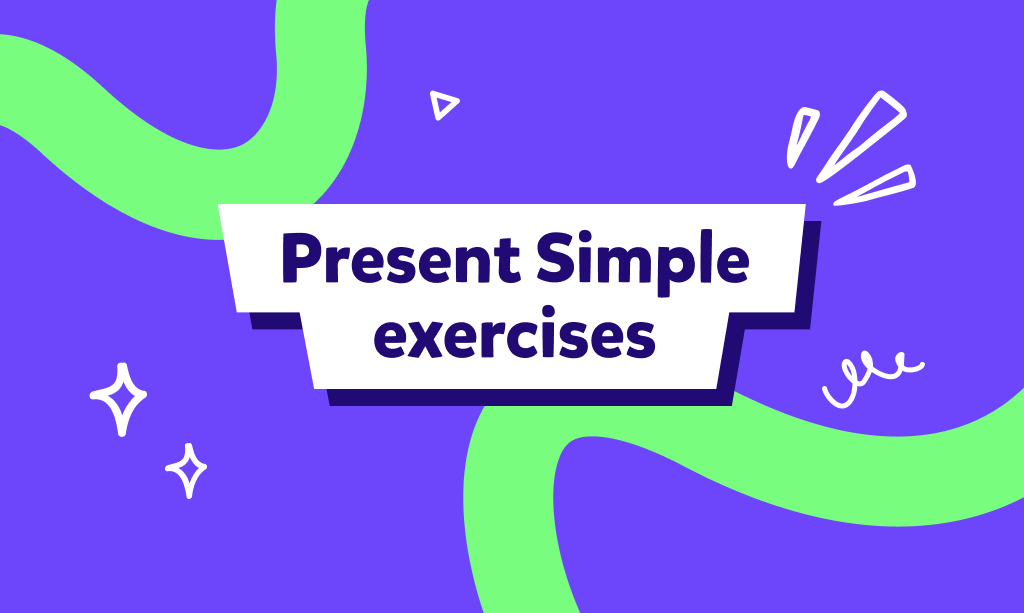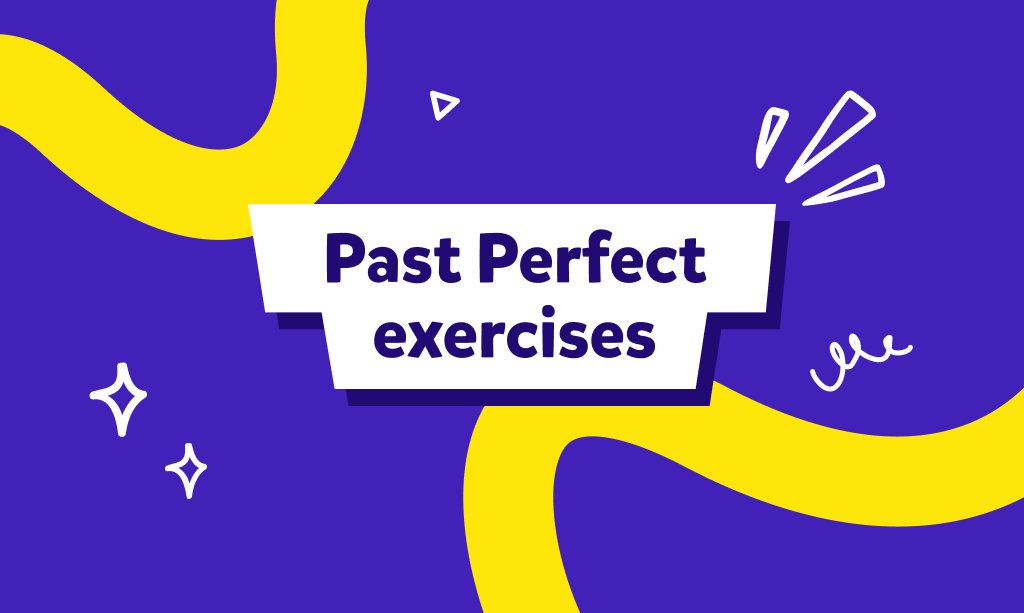- ما هو زمن المضارع البسيط في اللغة الإنجليزية؟
- تمارين زمن المضارع البسيط: تكوين الصيغة الصحيحة
- تمارين زمن المضارع البسيط في اللغة الإنجليزية: ترتيب الجملة
- تمارين زمن المضارع البسيط في اللغة الإنجليزية: الاستخدام مع الظروف
- تعرّفوا على نوفاكيد!
يُعتبر زمن present simple (المضارع البسيط) من أكثر الأزمنة استخدامًا في اللغة الإنجليزية وهو واحد من أبسط الأزمنة من حيث التركيب. يجب على كل طالب لغة إنجليزية معرفة كيفية تكوينه وأين يُستخدم. ولكن، كما هو الحال في تعلم أي عنصر من اللغة، يجب علينا ممارسة هذا الزمن بشكل متكرر لاكتسابه بشكل كامل.
في هذا المقال، قمنا بإعداد تمارين متنوعة على simple present tense (المضارع البسيط). كلما قمت بحل هذه التمارين المختلفة، ستلاحظ تحسنًا كبيرًا في استيعابك لهذا الزمن. إذًا، هيا بنا نبدأ في حل الأسئلة ونتحسن معًا في مهاراتنا في اللغة الإنجليزية!
ما هو زمن المضارع البسيط في اللغة الإنجليزية؟
قبل أن نبدأ بالتمارين، ما رأيك أن ننعش ذاكرتك قليلًا عن هذا الزمن؟ هيا بنا نتذكر بشكل سريع كيفية استخدام present simple وأين يُستخدم!
يمكننا ترجمة اسم هذا الزمن حرفيًا إلى “الزمن الحاضر البسيط”، واستخدامه مشابه جدًا لزمن “المضارع الدائم” في اللغة العربية. نستخدمه عند الحديث عن الحقائق العامة، العادات، الأوضاع الحالية، الأفكار السائدة، والأحداث المخطط حدوثها في وقت محدد في المستقبل.
تكوين زمن present simple سهل للغاية. أولًا، نبدأ بالفعل في شكله الأساسي (bare infinitive). بعد ذلك، إذا كان الفاعل هو he/she/it، نضيف “-s” أو “-es” إلى نهاية الفعل حسب الحالة. أما مع باقي الضمائر، فنترك الفعل في شكله الأساسي.
في الصيغة المنفية، نستخدم “do not” قبل الفعل الأساسي، ونتصرف مع الفعل المساعد “do” حسب القواعد السابقة.
هناك استثناء شائع وهو الفعل “to be” (يكون). تصريفه في present simple يعتمد على الفاعل: إذا كان الفاعل “I” نستخدم “am”، إذا كان “you/we/they” نستخدم “are”، وإذا كان “he/she/it” نستخدم “is”. في الصيغة المنفية، لا نستخدم “do”، بل نضيف “not” بعد تصريف الفعل “be”.
تكوين السؤال في present simple بسيط أيضًا. نضع “do” في بداية الجملة أو بعد كلمات “wh” مع ترك الفعل الأساسي في شكله الأصلي. أما إذا كان الفعل الأساسي هو “to be”، نضع تصريفه الصحيح في بداية الجملة أو بعد كلمة “wh”.
أخيرًا، يجدر بالذكر أن بعض الظروف الزمنية تُستخدم بشكل متكرر مع present simple مثل always، sometimes، never. كما نستخدم أحيانًا تعابير مثل “today” و”this …” للإشارة إلى الأوضاع الحالية.
كان الهدف من هذا الشرح هو تذكير سريع قبل الدخول إلى التمارين. إذا كنت ترغب في دراسة هذا الزمن بكل تفاصيله، يمكنك الرجوع إلى موضوعنا الخاص بشرح present simple tense!
تمارين زمن المضارع البسيط: تكوين الصيغة الصحيحة
في أول نوع من التمارين على present simple tense، سنعمل على تحسين قدرتنا على تصريف الأفعال بالشكل الصحيح في هذا الزمن. هيا نبدأ!
The manager ___ a meeting every Monday to discuss weekly goals (hold) 
holds
We ___ to the park every weekend if the weather is nice (go) 
go
My friend ___ like spicy food, so we always order mild dishes (do / not) 
doesn’t
The bookstore ___ a variety of novels and academic books (sell) 
sells
? your teacher assign homework every day (Do) ____ 
Do
The cat always ___ by the window in the afternoon to sunbathe (sit) 
sits
They ___ to the same gym, but at different times of the day (go) 
go
The company ___ new employees during the summer (hire) 
hires
She ___ to the library twice a week to study (go) 
goes
We ___ enjoy watching movies on the weekends (do) 
do
The bus ___ at the stop right in front of my house (stop) 
stops
? your brother live in the same city as you (Do) ____ 
Does
The flowers ___ beautiful in the spring when they bloom (look) 
looks
Why ___ he always arrive late to meetings? (do) 
does
Our neighbor ___ his car every Saturday morning (wash) 
washes
تمارين زمن المضارع البسيط في اللغة الإنجليزية: ترتيب الجملة
من المهم أن نفهم ونرى عن كثب بنية الجمل التي تُبنى باستخدام present simple tense (المضارع البسيط). لمساعدتك في هذا الموضوع، قمنا بإعداد بعض التمارين التي تتطلب منك ترتيب الكلمات في الجملة بشكل صحيح. دعونا نحلها معًا!
teacher / English / explains / the / very / grammar / well 
The English teacher explains grammar very well
go / the / kids / bed / at / early / school / nights / on 
The kids go to bed early on school nights
weather / the / affects / often / our / mood 
The weather often affects our mood
she / the / train / every / misses / week / because / late / she / is 
She misses the train every week because she is late
how / usually / long / it / does / you / to / work / take / to / get / ? 
How long does it usually take you to get to work?
dog / in / runs / the / always / park / morning / the 
The dog always runs in the park in the morning
parents / call / my / every / day / I 
I call my parents every day
plays / after / she / homework / piano / the / finishes / her 
She plays the piano after she finishes her homework
never / breakfast / you / why / eat / in / the / morning / ? 
Why do you never eat breakfast in the morning?
visit / their / parents / on / weekends / always / the / they 
They always visit their parents on the weekends
speaks / teacher / clearly / our / to / make / understand / sure / we 
Our teacher speaks clearly to make sure we understand
park / you / jogging / go / usually / the / in / do / morning / the / ? 
Do you usually go jogging in the park in the morning?
her / loves / my / swimming / niece / during / summer 
My niece loves swimming during the summer
check / the / email / do / you / how / often / your / day / ? 
How often do you check your email during the day?
friends / Saturday / she / always / goes / with / shopping / on / her 
She always goes shopping with her friends on Saturday
تمارين زمن المضارع البسيط في اللغة الإنجليزية: الاستخدام مع الظروف
ذكرنا أن هناك بعض الظروف التي نواجهها بشكل متكرر في الجمل التي تحتوي على زمن المضارع البسيط في اللغة الإنجليزية. إذاً، دعونا نقيس مدى معرفتنا بهذه الظروف ونعمل على تطوير مهاراتنا من خلال تمارين زمن المضارع البسيط!
She ___ takes her dog for a walk in the evening. (now / always / tomorrow) 
always
They ___ go on vacation in the summer. (yesterday / usually / next week) 
usually
We ___ eat out on weekends. (last time / sometimes / last year) 
sometimes
I ___ forget my keys when leaving the house. (tomorrow / often / yesterday) 
often
He ___ finishes his homework before dinner. (next time / last week / always) 
always
The shop ___ closes early on Sundays. (next week / often / yesterday) 
often
They ___ play football after school. (last week / tomorrow / regularly) 
regularly
She ___ drinks coffee in the afternoon. (last time / rarely / tomorrow) 
rarely
Do you ___ go to the gym before work? (yesterday / usually / next month) 
usually
We ___ study together for exams. (last year / tomorrow / often) 
often
The sun ___ sets in the west. (always / next week / tomorrow) 
always
How ___ do you check your phone? (last time / yesterday / often) 
often
I ___ go to the movies, I prefer watching at home. (never / tomorrow / last week) 
never
They ___ arrive on time for meetings. (always / yesterday / next month) 
always
He ___ forgets important dates. (rarely / tomorrow / last time) 
rarely
تعرّفوا على نوفاكيد!
نوفاكيد، تؤسس منهجية تعليمية قائمة على التفاعل والمرح والسعادة، لتحقق لكم ولأطفالكم نتائج رائعة، تساهم في إكسابهم الفهم المتقن للغة وتطوير مختلف المهارات الشخصية لهم. احصل على درسك المجاني الأول من نوفاكيد






































